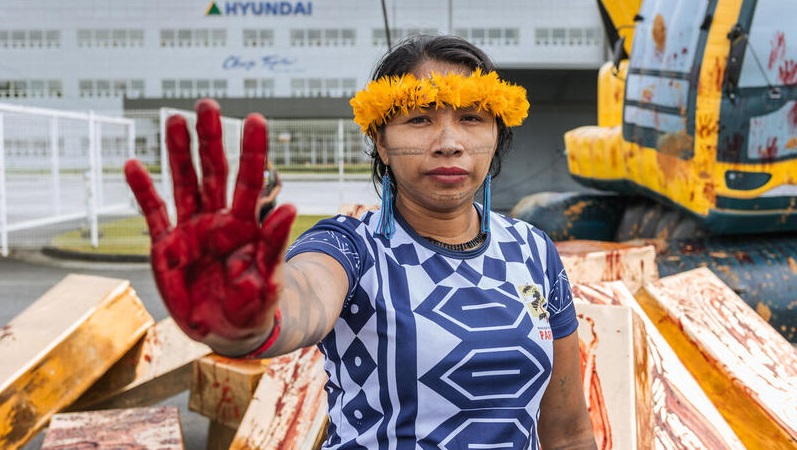Far-right president Jair Bolsonaro is gone but agribusiness and congress are still a threat to Brazil’s indigenous communities
The world watched in despair at the environmental damage President Jair Bolsonaro’s government wrought during his four years as presdident of Brazil.
Its crimes attracted global attention: from dismantling policies to protect the natural world, to the spiralling number of attacks on Indigenous People and incursions on their land, to deforestation reaching its highest levels for years.
For the European Union (EU), Brazil’s second largest trading partner and a large importer of the soy and beef driving deforestation in the country, alarm over these issues led to the suspension of a mammoth trade agreement, which had been 20 years in the making.
The free trade deal between the EU and Brazil and other Mercosur nations was approved in 2019 but was never ratified because of fears that it might intensify environmental and human rights abuses in Brazil.
Kerry rejects “climate reparations” but praises loss and damage fund
Now, with Bolsonaro ejected from office by the electorate, and his successor, Luiz Inácio Lula da Silva, making efforts to end deforestation and protect land rights, finalising the EU Mercosur agreement is a priority once again. It will be high on the agenda in the summit taking place this week in Brussels between EU and Latin American heads of state.
Ongoing threats
Yet despite the change of government in Brazil, the assault on Indigenous People’s land rights continues.
The reason is simple: Bolsonaro was defeated at the polls, but Bolsonarism survives as a political force.
Brazil remains deeply polarised, with the mighty agribusiness sector (responsible for a quarter of Brazil’s GDP in 2022) on one side of the divide, helping orchestrate the relentless attacks against Indigenous Peoples’ rights.
UAE’s Cop28 president plans “brutally honest” climate summit
While Lula has shown a serious intent to protect land rights and forests, he is being thwarted by his political opponents in Brazil’s National Congress, where he lacks a majority.
Agribusiness is helping drive proposals for laws which would enable mining to take place on protected Indigenous lands, and for Brazil to withdraw from the International Labour Organisation’s convention recognising Indigenous People’s right to free, prior and informed consent. Meanwhile the powers of the Minister for Indigenous Affairs powers have been eroded by Congress.
Last month, Brazil’s lower house voted overwhelmingly in favour of a bill that among other setbacks proposes the legal establishment of the Marco Temporal thesis, which only recognises Indigenous People’s right to territory they were occupying on October 5, 1988 – when the current Brazilian constitution came into force.
Marco Temporal poses a huge threat to Indigenous territories. The indigenous organisation APIB has estimated that almost 1,400 Indigenous lands are endangered by this proposal, which will open the door to farming and mining interests, and the inevitable environmental and social chaos that will follow in their wake – all in the name of commerce.
Fuel to the flames
A knock-on effect of these multiple legislative efforts to weaken Indigenous land rights is that it creates legal uncertainty in international trade, specifically putting companies at risk of importing goods produced on land whose ownership is disputed.
With corporate climate cheats on the chopping block, net zero is growing up
In this context, proceeding with the EU-Mercosur free trade agreement would add fuel to the flames: increasing the trade of agricultural commodities will only magnify the pressure on Indigenous lands.
As it stands, the EU-Mercosur agreement contains no measures to protect Indigenous Peoples. Before moving ahead with the deal, this must be rectified.
The agreement must explicitly provide Indigenous Peoples with the right to free, prior and informed consent about any trade or investment that may affect them. It should also champion traceability, so that all companies would have to know the origin of the goods they import. Finally, it should include sanctions for companies sourcing from Indigenous lands and committing environmental crimes.
In the aftermath of Lula’s election, news of the enduring threat to the Amazon and Brazil’s other biomes has largely slipped beneath the radar in the EU.
But it could be disastrous if EU lawmakers ignore it, as they push to revive the EU-Mercosur trade agreement without the right measures in place.
Dinamam Tuxá is executive coordinator of Articulação dos Povos Indígenas do Brasil (APIB), Brazil’s largest Indigenous Peoples’ representative body, representing more than 300 Brazilian Indigenous ethnic groups.
Pierre-Jean Sol Brasier is EU-Mercosur Trade Agreement Campaigner at forests and rights NGO, Fern.
Read More

